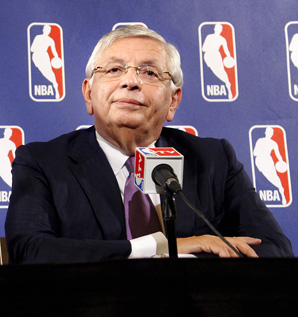Progress made in marathon meeting, but how much is unclear
Mr. Groundhog Day seemed destined to be the unofficial mascot on Day No. 118 of the work stoppage, with this sure to be another failed bargaining session like so many before it and the likely sacrifice of more regular-season games to come as a result. But after nearly two years of sit-downs that too often became stare-downs and one 15-hour meeting on Wednesday, the owners and players may finally be coming out of their basketball burrow.
Just six days after the dirt was flying between the two sides during the latest impasse, officials emerged from what was the second-longest meeting of the lockout to share cautious optimism that a deal could be reached by week's end. They announced to a bleary-eyed press corps at just after 3 a.m. ET that they would resume talks at 2 p.m.. Deputy commissioner Adam Silver added that the owners' labor relations committee would be consulted on the situation before then.
Above all else, it was union director Billy Hunter's claim that, despite two weeks of regular-season games having already been canceled, an 82-game schedule remains possible if there is an agreement by "Sunday or Monday." Commissioner David Stern didn't discount the possibility, saying they were making an attempt to "try to schedule as many games as possible. Whether that gets to be -- if we can make a deal this week ... 82 games or not is really dependant on so many things that have to be checked." A "compressed" schedule would almost certainly be needed to pull off such a feat.
So how much progress was made and how real is this renewed hope? It is, as the key parties made clear, hard to say.
With both sides indicating that only system issues were discussed and not the split of basketball-related income (BRI) that had caused the latest break in talks, National Basketball Players Association president Derek Fisher took the measured approach in his comments.
"I can't say that major progress was made in any way but there was some progress on some of our system issues -- obviously enough for us to come back at 2 p.m. tomorrow," Fisher told reporters. "And we'll continue to work through as long as we possibly can and as hard as we possibly can to see if we can get a deal done. But we're not going to get ahead of ourselves at this point."
Yet when asked to detail the progress on the system issues such as the luxury-tax system, salary-cap exceptions and contract lengths, Hunter seemed to hint that Thursday afternoon could bring the type of progress that you don't have to downplay to the public.
"While we're not prepared to talk about the specifics of the progress tonight, we may be prepared to discuss it tomorrow," Hunter said.
Stern, who missed last Thursday's session because of illness, was equally hesitant to offer any predictions but admitted progress had taken place: "I can't describe it," he said, "other than to say it's much better than not making any progress at all.
"This has been a very arduous and difficult day, and productive. Tomorrow is going to be just as arduous and difficult, if not more so. We hope that it can be as productive."
The discussion on system issues was a positive sign in light of how the talks ended last Thursday. According to Hunter at the time, the owners offered a 50-50 split of BRI with the qualifier that the system issues would not be discussed without an agreement on the revenue. It was a deal-breaker in every sense, as the union -- which countered with an offer of 52.5 percent that was declined -- simply couldn't assess where it might eventually fall on the financial front without knowing the details of the system and its structure. But progress on system issues could very well lead to an agreement on the BRI split and ultimately to the end of the lockout.
"There's no question that today was a better day than last Thursday," Silver said. "I think it's too early -- not just in the morning, but still in the negotiations to express confidence that we're at a deal. There's no question, though, that we did make progress on some significant issues. But there are still some very significant issues left.
"I think we did a good job collectively of crystallizing what those issues are, and so that we can tackle them immediately when we resume at 2 o'clock tomorrow. And this break also gives us a chance to reconvene with our labor relations committee to make sure that ... the owners who were here tonight together with that committee has had a chance to make a fair assessment of what possible compromises there may be left for us to make."
Which is where the trouble could lie.
For all the optimism, there is reason to reserve judgment if only because of the nature of the meeting. This was the kind of small-group session that has yielded positive results before, only to see progress halted once the respective pitches didn't get past the larger group of constituents.
Stern and Silver were joined by Spurs owner Peter Holt, Timberwolves owner Glen Taylor, Knicks owner Jim Dolan and league attorneys on the NBA's side, while the union was reportedly represented by Hunter, Fisher, executive vice president Maurice Evans, economist Kevin Murphy and attorney Ron Klempner.
But what happens when hard-line owners like Cleveland's Dan Gilbert and Portland's Paul Allen re-enter the conversation Thursday afternoon? Or when the stars such as Boston's Kevin Garnett or the Lakers' Kobe Bryant weigh in on the fact that the 53-percent-BRI-line-in-the-sand has long since been crossed by the union? Stern himself got it right near the end of his early-morning media briefing, offering a bottom-line assessment that fans would be wise to remember.
"There's no deal on anything unless there's a deal on everything," he said.





